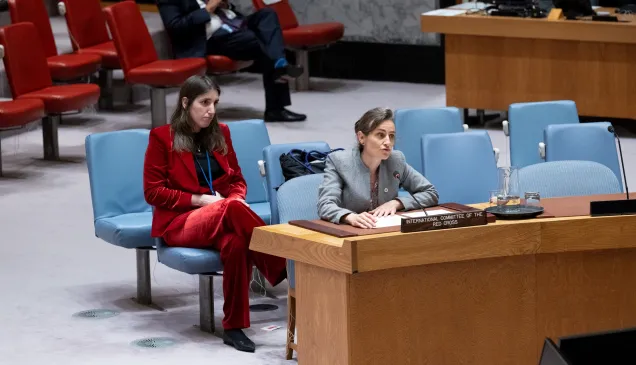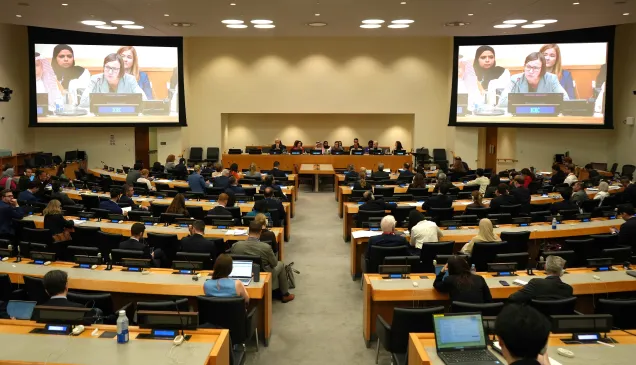As delivered
Madam President, esteemed colleagues,
We thank Indonesia for its stewardship of this debate and we note with appreciation its continued support in hosting an important regional conference for armed forces in Jakarta in a few weeks from today. We trust the conference will follow the debate here and lead to further efforts to strengthen the protection of civilians through better peacekeeping.
Madam President, we appreciate your country's and your personal commitment to this issue, in particular your focus on a strengthened role of women in peacekeeping.
Thank you also, Secretary-General for your strong leadership in highlighting the critical protection gaps with which we are confronted today.
Twenty years ago, the Security Council invited the ICRC to brief on the Protection of Civilians and adopted the Presidential Statement which further welcomed its contribution to this issue.
These last two decades have shown us how the political and military decisions made in this chamber impact the human conditions on the battlefields around the world.
These decisions can save lives or end them; they can create hope or misery; and they can bolster or break the norms that protect universal humanitarian laws and principles.
Whether a city is bombed to rubble, or whether civilians and hospitals are spared,
Whether children are sent to school or recruited into armed forces,
Whether prisoners are tortured or treated with decency,
Whether families ever hear from their loved ones again.
Excellencies, not only are the decisions of all UN Member States and especially the Security Council important, the absence of decisions by the Council also takes its toll on civilians. In battlefields where the ICRC is today, too many actors take the absence of political convergence amongst you as a free ride for military operations without any limitations and without accountability.
Seventy years after the universal ratification of the Geneva Conventions, more than 40 years after the adoption of the Additional Protocols to the Geneva Conventions, and 20 years after the UNSC held its first Protection of Civilians debate, we are still seeing outrageous violations on a daily basis.
While we do understand that political consensus is difficult, we ask you to be clearer in your support for the respect of international humanitarian law – and in stating and following through on the simple truth that no one is above the law and no civilian can be excluded from protection.
Today, in the face of changing conflict dynamics, international humanitarian law and international human rights law continue to be the bedrock.
Humanitarian action is adapting to people's changing needs. And we call on States to adapt too:
By prioritizing the protection of civilians;
By upholding international humanitarian law and influencing their partners to do so;
By setting clearer frameworks for their troops and for those supported;
By setting clearer ground rules;
By vetting partners, training and instructing them;
By applying highest standards of precaution in weapons transfers;
By setting up clear oversight and accountability frameworks.
Through these measures you can influence behavior and protect populations exposed to war and violence.
This debate must be anchored in the experiences and needs of people and communities who suffer the daily brutalities of war.
Measures must be taken which protect civilians from physical harm but also from the invisible, psychological harm from abuses like sexual violence, torture in detention, or not knowing the fate of missing loved ones.
We must also move beyond the victim mindset to understand people and communities as agents of their own protection and experts of their own situation. They have individual needs, but they also have individual skills, capacities and enormous resilience.
They do not wait for external interventions to address the problems and threats they are facing. They decide how best to travel in groups and to ensure that children, older people and people with disabilities are not left behind during flight, choosing in advance which road to take, discussing locations to avoid and negotiating directly with weapons bearers. Connectivity has strengthened the possibilities for self-protection measures and we all need to adapt to these new developments.
While we ask more from the members of the Security Council and the international community at large, we ask at the very least that you do not hinder people in need in their effort to protect themselves.
Too often do we see that in addition to being exposed to war and violence, populations are stopped from reaching safer spaces, are constrained by bureaucratic obstacles and are limited in their free movement.
Dear colleagues, in putting people at the center, we can see that protective layers must be built across three interconnected spheres in which proactive policies and practices of protection are needed: individual, community, and contextual levels.
When an individual faces immediate threats to safety and dignity, harm can be greatly reduced by strict adherence to the rules regulating the use of force, through more stringent arms controls and through humane treatment in transfers of detainees and in detention.
We cannot gloss over the issue of missing people. Hundreds of thousands of people – if not millions – are missing worldwide.
Their family members suffer deep losses, unanswered questions, their pain only deepening with time. Such festering wounds can harm the fabric of whole societies, undermining relations between groups and nations, sometimes decades after the original events.
For the sake of individuals, and whole communities, the humanitarian imperative is clear: families have a right to know the fate of their loved ones and States must take steps which prevent people from going missing in the first place, for instance by registering detainees and notifying their families. The ICRC and the Red Cross and Red Crescent Movement overall stand ready to support States in these efforts.
The ICRC has made specific efforts to ensure that community-based protection approaches are integrated more systematically into their responses. This is part of our commitment to being accountable to affected populations.
Importantly, these activities can never be considered a substitute for the protection responsibilities of authorities, and States. States must put measures in place to protect their population in line with their obligations. Communities need space to protect themselves and States must be more proactive in granting it.
The ICRC is looking to build on our role of neutral intermediary to support these activities. For example, in supporting communities to self-advocate to authorities or weapon bearers in order to ensure their safety as they go about their daily lives – collecting food and water, seeking medical help, attending schools and more. The ICRC also organizes information sessions for families on their legal rights so they can themselves approach authorities in a more autonomous way.
Additionally, the ICRC is broadening its assistance to create stronger communities through micro-economic projects aiming at reducing exposure to risk – distributing seeds that can be grown in towns to avoid women being assaulted while going to the field; or providing income-generating activities to reduce harmful behavior such as sending children out to work.
Protections in fragile settings will also require broader investment, which go beyond the work of humanitarian actors such as the restoration of markets and enabling sustainable economic activities.
In the wider context of protection: with increasingly urbanized warfare, it has become starkly evident that the effects of bombing and shelling in cities are almost never limited to military targets.
In densely populated areas, the wide area impact of heavy explosive weapons is now well known, and their use against targets that are smaller than their area effects is all too often ethically, and maybe even often legally, indefensible.
The price is too high to be justified – beyond the deaths and injuries of civilians, we see damaged infrastructure leading to the collapse of essential health, water systems, and more.
It is not only civilian infrastructure that is harmed – the environmental consequences of conflict are often overlooked. International humanitarian law protects the natural environment as a civilian object.
This includes vital natural resources which, if damaged can have implications not only for the survival of civilian populations but also for environmental risks.
The ICRC this year will release updated guidelines on international humanitarian law and the natural environment. We will be engaging with militaries about these guidelines, and with parties to conflict to ensure practical measures are taken that protect the natural environment.
We are also seeing a gap in protection risks and vulnerabilities in the digital environment. People may face hate crimes, violence, discrimination, digital surveillance and profiling because of their online presence and/or use of digital technologies, including by governments, the private sector and other non-state actors.
In conflict zones, this can be lethal.
Data collected on affected people, including through humanitarian operations, must not become a source of additional risk for populations or humanitarian organizations.
States should promote a "do no harm" approach, backed by accountability mechanisms, for the responsible use of technologies and data.
Madam President, twenty years on from when the ICRC first addressed the Protection of Civilians in the Security Council, violations and abuses continue. Let us work together to respond on these three levels – individual, community and the wider context.
As we mark the 70th anniversary of the Geneva Conventions this year, we urge States to recall their spirit, which is to uphold human dignity in the midst of armed conflict.
I thank you.



